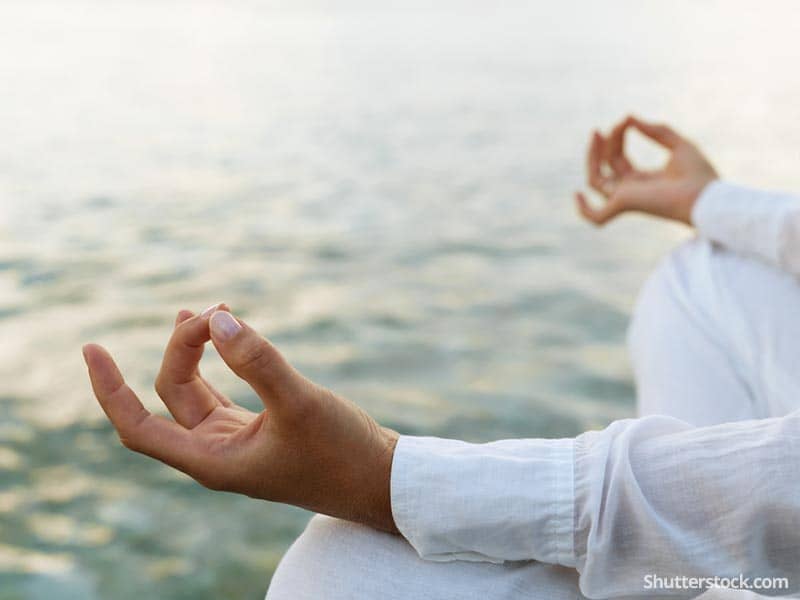
For most people, to meditate is to come home to who you really are. Practicing meditation allows you to drop through the geographics of confusion to a place where your good heart and wisdom are present, even amid profound challenges. The word “meditation” is like the word “sport.” It’s a general term referring to numerous different approaches to mental training, each of which strengthens different capacities like concentration, attention, and wisdom.
The most common meditation practice in Buddhism is promoting attentional balance by bringing your attention to one object, like a physical sensation, the breath, a word, an image or a quality of mind and heart. This type of meditation strengthens the ability to stay grounded and focused on seeing clearly whatever is arising in the present moment. A critical step in all meditation practices is the development of a compassionate heart. This is fundamentally about benefiting others, thus enhancing our unselfishness and moving us away from self-centeredness. This aspect of practice envelops all of what we do and how we meet the world and is a reflection of our character.
Other practices focus on the development of other healthy mental qualities, like unselfish joy, loving-kindness, happiness, patience, generosity, insight, concentration, and wholeheartedness. Watering the seeds of our natural wisdom is developed through specific practices. For example, as we meditate, we might realize that no matter how solid things are or might feel, impermanence always prevails. On the other hand, we may realize that there’s no separate self, and everything is made of parts and is contingent on everything else, which are powerful realizations. There’s also the meditation of nonmeditation, which involves no technique.
This technique is the most challenging because our busy minds are constantly churning, and relaxing may not be easy for us. However, one day, we’ll drop into a quality of awareness where choosing isn’t necessary and where our opinions fall away, and we will become free of stories, narratives, and constructs. We can simply flow in the present moment without the artifice of any specific top-down practice, meditating on our experience. These short meditation practices, found in Joan Halifax’s In a Moment, In a Breath: 55 Meditations to Cultivate a Courageous Heart, are for use in our everyday lives. While these meditations are rooted in Buddhist traditions, they’re meant to be accessible and help all.
In a moment and a breath, we can remind ourselves to get grounded, remember our motivation not to cause harm and to help others, and have the wherewithal to meet whatever the moment is giving. Here are some meditations to develop a courageous heart.
Connecting with the earth.
Sit comfortably and let your attention rest on your body and breath. Now, tap into your connection with the earth and invite the earth’s stability into your heart, body and mind. Finally, experience the strength of your connection with the earth.
Supported by the earth.
On your in-breath, focus your attention on the in-breath. On the out-breath, put your attention on your whole body. Now, shift your focus to the sensation of your feet on the floor or your tailbone on the cushion of your chair. Sense support and strength through this connection to the earth and rest in the experience of being stable, grounded and at peace.
Opening the heart’s door.
Sit in a relaxed way and bring your focus to your chest. Tune in to the open, tender feeling of your heart and reflect on the fact that everyone faces challenges. Think back to a time when you were struggling and imagine being free from suffering and helping others with being free of suffering. Feel the strength of your resolve coming from your stomach. Let go of any tightness in your chest as you let your breath pass through your heart. Remind yourself of your tenderness and commitment to serving others. Tell yourself, “My heart’s door is open.”
Soft front, strong back.
On your inhalation, focus your attention and release all interruptions. When you exhale, drop your attention into your body and relax, feeling your spine, which exemplifies poise. Through your back, you can be whatever is present. Experience the front of your body as receptive, permeable, and open. Through your open heart, bring the world into your experience and let your strong back and open heart give you an authentic presence.
Bearing witness.
Remember your intention to be of genuine benefit to others. Let your heart, mind and body settle with your breath’s support. Give yourself time and become relaxed, receptive, still and open. Imagine sitting across from someone who’s struggling or happy. Bearing witness, don’t separate yourself from whatever they experience. Without evaluating or judging, become the situation. You’re not this person, but you’re also not separate from this person. Rest in this experience of being intertwined as you bear witness to the suffering and joy of this life.
Embrace the unknown.
Call your attention to your breath and allow your body to settle. Envision a just and peaceful future. Sitting with the unknown, ask yourself what might truly serve and see what comes up in your heart. Recall your promise to end suffering and act from love, courage and wisdom.
Tuning your mind toward your body.
Take a deep breath and let your body settle. Transfer your attention to your scalp, and as thoughts arise, let them arise. Then, shift your attention to your forehead, letting go of any worries. Breathe into your eyes and let them relax. Bring awareness to your ears, feeling grateful for the ability to listen. Move your attention to your mouth and let out a slight smile. Continue to breathe into and relax your neck and throat, hands and arms, shoulders, spine, heart, pelvis, and feet. Relax with a quiet and open heart, mind and body.
These meditations may be short, but they can help in the busyness of our daily lives and support better decision-making. For example, when you wake up in the morning, you can take some time to drop into your breath and remember your intention. So, if you have the time, try one of these brief meditations and watch how your life improves.

